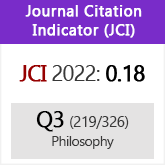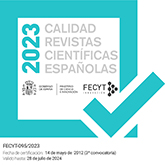The Posthumanist Turn in Humanities and its Implications for Philosophy of Technology
DOI:
https://doi.org/10.3989/isegoria.2020.063.03Keywords:
Posthumanism, Artifact, Hybridization, ImmanenceAbstract
This paper aims to critically evaluate some impacts of the so-called “posthumanist turn” for philosophy of technology, with special reference to the problem of ontological status of artifacts. In the first place, we reconstruct the meaning and scope of posthumanist turn in social and human sciences, while we indicate in what sense this turn questions a group of traditional operative concepts for philosophy. Second, we propose to admit a “weak” version of posthumanism for philosophy of technology. In this sense, two lines of research compatible to this “weak” approach are pointed out. The first one consists in the exploration of immanent aspects of technical objects. The second one commits us to introduce the category of “hybridization” in order to account for the complex and multidimensional relationships between humans and environments.
Downloads
References
Appadurai, A. (ed.) (1986), La vida social de las cosas. Perspectiva cultural de las mercancías, Barcelona: Grijalbo.
Barrett, H.C. (2015) The shape of thought. How mental adaptations evolve, New York: Oxford University Press. https://doi.org/10.1093/acprof:oso/9780199348305.001.0001
Benjamin, W. (2015) "La obra de arte en la época de su reproductibilidad técnica" en Estética de la imagen. Buenos Aires: LaMarca Editora.
Bijker, Wiebe (1995), Of Bycicles, Bakelites, and Bulbs. Toward a Theory of Sociotechnical Change, Londres: MIT Press.
Bimber, Bruce (1996), "Tres caras del determinismo tecnológico", en Smith, M y Marx, L. (eds), Historia y determinismo tecnol.gico, Madrid: Alianza, pp. 95-116.
Boivin, Nicole (2008), Material cultures, material minds. The impact of things on human thought, society and evolution, New York: Cambridge University Press.
Braidotti, R. (2013), The posthuman, Cambridge: Polity.
Broncano, Fernando (2009), La melancolía del ciborg, Barcelona: Herder.
Broncano, Fernando (2012), La estrategia del simbionte. Cultura material para nuevas humanidades, Salamanca: Delirio.
Callon, Michel (2008), "La dinámica de las redes tecno-económicas", en Thomas, H. y Buch, A. (comps.), Actos, actores y artefactos. Sociología de la tecnología, Bernal: Universidad Nacional de Quilmes.
Clark, A. (2004), "Towards a science of the bio-technological mind", en: Gorayska, B. y Mey, J. (eds.), Cognition and Technology. Co-existence, convergence and co-evolution, John Benjamins, Amsterdam. https://doi.org/10.1075/z.127.03cla
Clark, Andy (2003), Natural-Born Cyborgs, Oxford: Oxford University Press.
Clark, Andy y Chalmers, David (1998), "The extended mind", Analysis 58: 10-23. https://doi.org/10.1093/analys/58.1.7
Dawkins, Richard (1993), El gen ego.sta. Las bases biol.gicas de nuestra conducta, Barcelona: Salvat.
Descola, Philippe (2012), M.s all. de naturaleza y cultura, Buenos Aires: Amorrortu.
Di Paolo, Ezequiel, Barandiaran, X. y Rohde, M. (2009), "De ning Agency: Individuality, Normativity, Asymmetry, and Spatio-temporality in Action", Adaptive Behavior, Vol 17(5): 367-386. https://doi.org/10.1177/1059712309343819
Donald, Merlin (1991), Origins of the Modern Mind. Three Stages in the Evolution of Culture and Cognition, Cambridge: Harvard University Press.
Feenberg, Andrew (1999) Questioning technology, Londres: Routledge.
Gell, Alfred (1998), Art and agency. An Anthropological theory. Oxford: Clarendon Press.
Haraway, D. (1995), Ciencia, cyborgs y mujeres. La reinvenci.n de la naturaleza, Madrid: Cátedra.
Harman, Graham (2015), Hacia el realismo especulativo, Buenos Aires: Caja Negra.
Hodder, Ian (2012) Entangled. An Archaeology of the Relationships between Humans and Things. Wiley-Blackwell, Londres. https://doi.org/10.1002/9781118241912
Holbraad, Martin y Pedersen, Morten (2017), The ontological turn. An anthropological exposition, Londres: Cambridge University Press. https://doi.org/10.1017/9781316218907
Ihde, Don (2004), Los cuerpos en la tecnolog.a, Barcelona: UOC.
Ihde, Don (2005), «La incorporación de lo material: fenomenología y filosofía de la tecnología», Revista CTS. Revista iberoamericana de Ciencia, tecnología y sociedad, 2, (5), pp. 153-166.
Ingold, Tim (2008), "When ANT meets SPIDER: Social theory for arthropods", en: C. Knappet and L. Malafouris (eds.), Material Agency: Towards a Non-Anthropocentric Approach, pp. 209-15. New York: Springer. https://doi.org/10.1007/978-0-387-74711-8_11
Ingold, Tim (2000), The perception of the enviroment. Essays on livelihood, dwelling and skill, New York: Routledge.
Laland, K., Odling-Smee, J. y Feldman, M. (2000) "Niche construction, biological evolution,and cultural change", Behavioral And Brain Sciences 23, 131-175. https://doi.org/10.1017/S0140525X00002417
Latour, B. (1992), "Where are the missing masses? Sociology of a few mundane artefacts", en: Bijker, W. y Law, J., Eds., Shaping Technology-Building Society. Studies in Sociotechnical Change, Cambridge: MIT Press.
Latour, Bruno (1991), "Technology is society made durable", en: Law, J. (Ed.), A sociology of monsters? Essays on power, technology and domination, Sociological Review Monograph, Londres: Routledge, (38), 103-131. https://doi.org/10.1111/j.1467-954X.1990.tb03350.x
Latour, Bruno (1994a), We Have Never Been Modern, Massachusetts: Harvard University Press.
Latour, Bruno (1994b), "On technical mediation. Philosophy, sociology, genealogy", Common knowledge, (3), 2, pp. 29-64.
Latour, Bruno (2005), Reensamblar lo social. Una introducci.n a la teor.a del actorred, Buenos Aires: Manantial.
Malafouris, Lambros (2013), How things shape the mind. A theory of material engagement, Cambridge: MIT Press, 2013. https://doi.org/10.7551/mitpress/9476.001.0001
McLuhan, Marshall y McLuhan, E. (1990) Leyes de los medios. La nueva ciencia, México, Alianza, 1990.
McLuhan, M. (2009) Comprender los medios de comunicaci.n. Las extensiones del ser humano, Barcelona: Paidós.
Menary, R. (ed.) (2010), The extended mind, MIT Press, Cambridge. https://doi.org/10.7551/mitpress/9780262014038.001.0001
Miller, Daniel (ed.) (2005), Materiality, Londres: Duke University Press.
Ong, Walter (1987), Oralidad y escritura: Tecnologías de la palabra, México: FCE.
Parente, D. (2016), "Los artefactos en cuanto posibilitadores de acción. Problemas en torno a la noción de agencia material en el debate contemporáneo", Revista Colombiana de Filosofía de la Ciencia, vol. 16, núm. 33, pp. 139-168. https://doi.org/10.18270/rcfc.v16i33.1937
Parente, D. (2019), "Organismos, máquinas y bioartefactos. Problemas y variantes en la perspectiva de G. Simondon", ArtefaCToS. Revista de estudios de la ciencia y la tecnología, Vol. 8, No. 1, 9-27. https://doi.org/10.14201/art201981623
Pinch, T. y Bijker, W. (1984), "The Social Construction of Facts and Artefacts: Or How the Sociology of Science and the Sociology of Technology Might Benefit Each Other", Social Studies of Science, Vol. 14, No. 3, 399-441. https://doi.org/10.1177/030631284014003004
Sandrone, D. (2016) Aportes para una nueva concepción del diseño tecnológico: Un estudio filosófico de su naturaleza y su rol en el cambio tecnol.gico. Tesis doctoral. Facultad de Filosofía y Humanidades, Universidad Nacional de Córdoba, Córdoba, Argentina.
Schaeffer, J.M. (2009), El fin de la excepción humana, Buenos Aires: FCE.
Simondon, Gilbert (1969), Du mode d'existence des objets techniques, Paris: Aubier- Montaigne.
Sloterdijk, Peter (2006), Normas para el parque humano, Madrid: Siruela.
Sperber, Dan (2007), "Seedless grapes: nature and culture", En: Margolis, E. y Laurence, S. eds., Creations of the mind. Theories of artifacts and their representation, New York: Oxford University Press.
Sterelny, Kim (2010), "Minds: extended or sca olded?", Phenomenology and the Cognitive Sciences, Vol. 9, (4), 465-481. https://doi.org/10.1007/s11097-010-9174-y
Stiegler, Bernard (1994), La technique et le temps, vol. 1., Paris: Galilée.
Tomasello, Michael (1999), The cultural origins of human cognition, Londres: Cambridge University Press.
Verbeek, Peter-Paul (2005), What things do. Philosophical reflections on technology, agency and design, Pensylvania State University Press. https://doi.org/10.1515/9780271033228
Viveiros de Castro, E. (2010), Metafísicas caníbales. Líneas de antropologia postestructural, Buenos Aires: Katz. https://doi.org/10.2307/j.ctvm7bdz4
Downloads
Published
How to Cite
Issue
Section
License
Copyright (c) 2020 Consejo Superior de Investigaciones Científicas (CSIC)

This work is licensed under a Creative Commons Attribution 4.0 International License.
© CSIC. Manuscripts published in both the printed and online versions of this Journal are the property of Consejo Superior de Investigaciones Científicas, and quoting this source is a requirement for any partial or full reproduction.All contents of this electronic edition, except where otherwise noted, are distributed under a “Creative Commons Attribution 4.0 International” (CC BY 4.0) License. You may read here the basic information and the legal text of the license. The indication of the CC BY 4.0 License must be expressly stated in this way when necessary.
Self-archiving in repositories, personal webpages or similar, of any version other than the published by the Editor, is not allowed.














